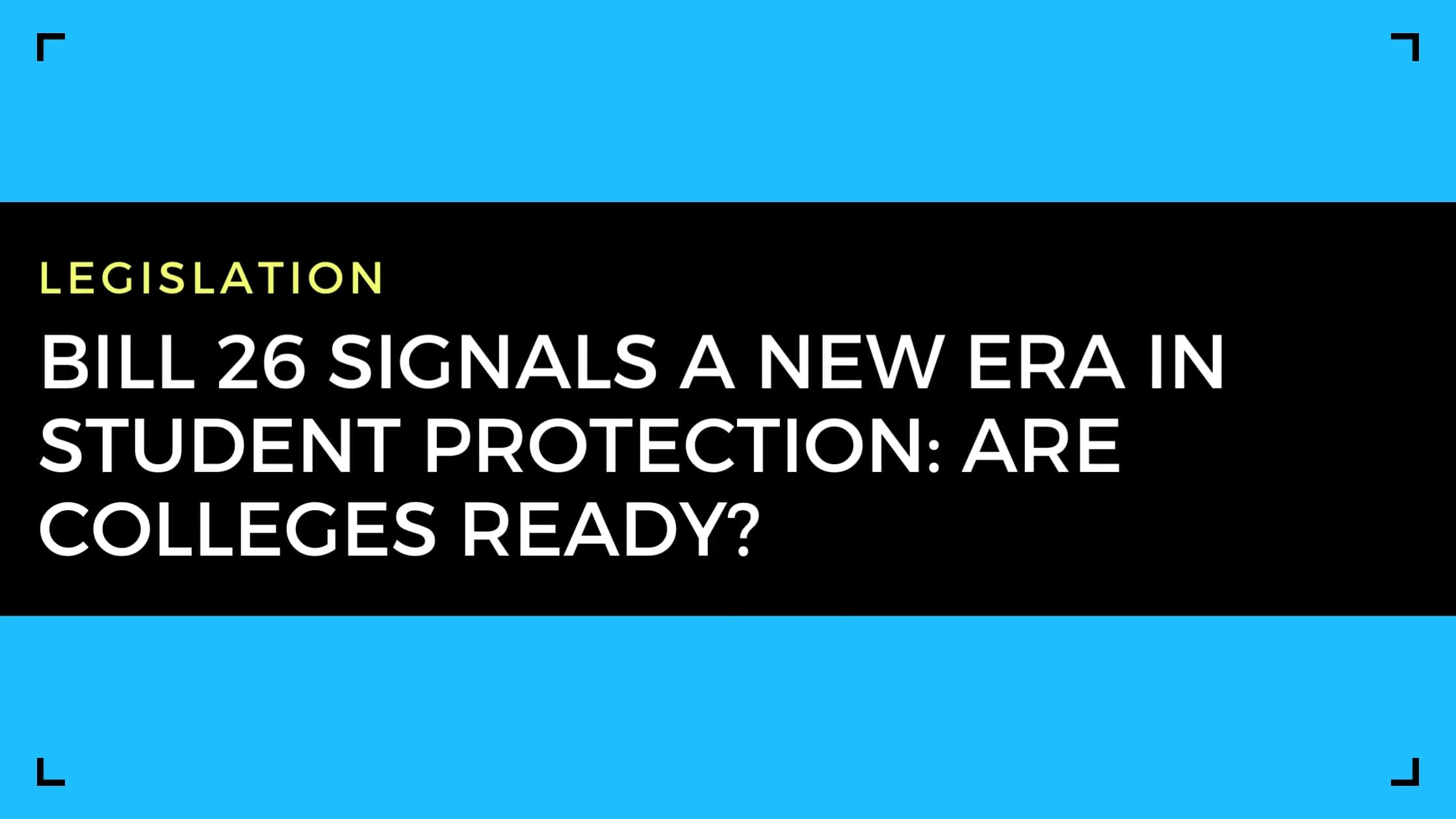The recent passage of Bill 26 marked the start of a new era in student protection from sexual misconduct, but private career colleges could be left behind if they do not step up their compliance efforts quickly.
The legislation, formally known as the Strengthening Post-secondary Institutions and Students Act, took effect July 1, forcing a wave of new requirements on post-secondary institutions throughout the province. However, it seems that few in the sector — including colleges and their regulators — were truly ready for the changes, despite having more than six months to get themselves in line. In fairness to private sector institutions, many are still recovering from COVID, and pivoting into changing program delivery modes post-COVID.
If you need help complying with Bill 26, please contact us.In the meantime, here are four things you should know about the new law.
What has changed?
One of Bill 26’s main functions was to amend the Private Career Colleges Act (PCCA) adding a new section on “sexual misconduct” by employees towards students, which can include touching, behaviour or remarks of a sexual nature.
All institutions governed by the Act must create a sexual misconduct policy in response to the new legislation. This policy should outline rules governing employee-student sexual behaviour and include examples of potential disciplinary measures where employees breach the policy.
The new legislation prohibits private career colleges from re-hiring an employee who was terminated or who resigned after committing sexual misconduct against a student. It also restricts the use of non- disclosure agreements that would prohibit anyone related to the institution from revealing the existence of a complaint.
In addition, provisions in Bill 26 dictate that any termination or disciplinary action taken by a college for sexual misconduct against a student is automatically deemed to be for “just cause,” disentitling the employee from notice of termination or termination pay.
Superintendent’s resources
Anyone expecting guidance from Ontario’s Superintendent of Private Career Colleges on compliance with Bill 26 may be disappointed.
The industry regulator, responsible for enforcement action against registered and unregistered institutions operating in breach of provincial law, appears to be chronically understaffed and under-resourced for the enormous level of responsibility now delegated to it. While the writer has represented private industry stakeholders well prior to the coming into force of the PCCA, I concede that the Superintendent’s consumer protection role is important, and should not be undermined by short-sighted budgetary considerations. Compliant institutions admittedly benefit from high standards, and the preservation of the public trust in the private post-secondary education sector.
The December 2021 release of the provincial Auditor General’s annual report, identified a number of problems within the sector. The Report was published during the worst pandemic the modern world has ever seen, and both the Superintendent and her registrants were scrambling to ensure the latter could meet prescribed learning outcomes. In the author’s view, there should be a balance struck between ensuring high standards are met, and ensuring that all private higher education institutions are given a reasonable opportunity to come into compliance where they fall short or commit minor breaches of the PCCA.
On the transactional side, and despite the Superintendent’s stated “notification” versus “approval” requirement (a misnomer, since purchasers are still required to comply with the registration requirements of s.14 PCCA post-as long as they remain registrants), the government is extremely backlogged. There is much acquisition activity in this space given Canada’s current labour market demand, its aging workforce, and its need for international students to form part of the next generation’s tax base. Vocational training is red hot.
The time to act is now
Notwithstanding the backlog within the Private Career College branch, private career colleges should not construe this as an invitation to drag their feet on compliance.
I’ve been around long enough to witness the damage a regulatory run-in can cause, and it is never a pretty sight. Those who offend the provisions of the PCCA could find themselves exposed to a variety of sanctions ranging from a mere warning to monetary penalties and tuition refund orders, all the way up to an immediate suspension and licence revocation, depending on the severity of the breach and whether the objectionable conduct is ongoing.
While some private career college operators can recover from the financial hit associated with, say, a monetary penalty, the embarrassment and reputational damage of a published enforcement Notice is often harder to overcome, and can have a lasting impact on enrolment numbers. Enrolment is the lifeblood of schools.
Legal help is a must
With the stakes so high, private career colleges must get the job done right by consulting a lawyer experienced in the sector.
In some ways, compliance with Bill 26 will be relatively straightforward because it builds on existing requirements imposed by successive provincial governments.
Over the last decade or so, larger Ontario employers in the province have been forced to develop policies and risk assessment frameworks regarding workplace violence and harassment. For post-secondary institutions, there are additional policy and reporting requirements concerning sexual violence that were brought in under the previous Wynne government.
The Bill 26 amendments must also be reflected in any agreements and policies that a private career college has. That includes student enrolment contracts, which I routinely draft and update for my post- secondary institution clients. Think of enrolment agreements as “fluid” documents, that must respond to this kind of change, as well as new Policy Directives brought in by the Superintendent on the fly, which have the force of law. Yes, the private career college sector is currently vibrant, but owners must ensure that the risk management side of their business remain as nimble as the programs they put out to their students.
Look forward to your comments, criticisms, and feedback! Thanks for reading.
